NCS1102D: An Essay on Questioning Skills of Clinical Facilitators
VerifiedAdded on 2023/04/21
|27
|7257
|398
Essay
AI Summary
This essay analyzes an article focusing on the questioning skills of clinical facilitators who support undergraduate nursing students. The original study explored whether facilitators primarily ask low-level questions that require simple recall, or higher-level questions that foster critical thinking. The findings indicated that most questions were knowledge-based, but facilitators with education-related training asked more higher-level questions. The study suggests a need for targeted education to enhance facilitators' ability to frame questions that promote application, analysis, synthesis, and evaluation. This document is available on Desklib, a platform offering solved assignments and study tools for students.
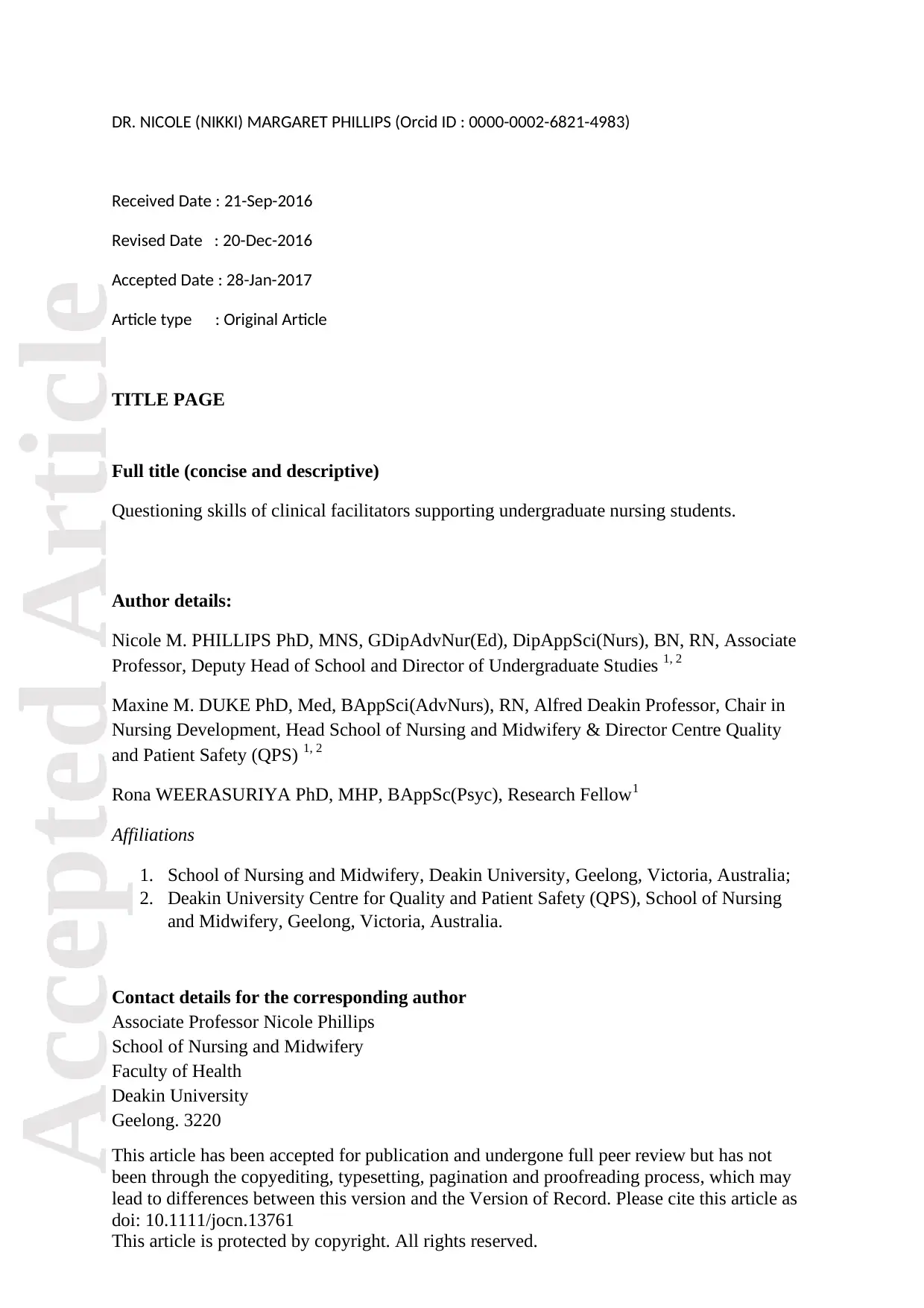
Accepted Article
This article has been accepted for publication and undergone full peer review but has not
been through the copyediting, typesetting, pagination and proofreading process, which may
lead to differences between this version and the Version of Record. Please cite this article as
doi: 10.1111/jocn.13761
This article is protected by copyright. All rights reserved.
DR. NICOLE (NIKKI) MARGARET PHILLIPS (Orcid ID : 0000-0002-6821-4983)
Received Date : 21-Sep-2016
Revised Date : 20-Dec-2016
Accepted Date : 28-Jan-2017
Article type : Original Article
TITLE PAGE
Full title (concise and descriptive)
Questioning skills of clinical facilitators supporting undergraduate nursing students.
Author details:
Nicole M. PHILLIPS PhD, MNS, GDipAdvNur(Ed), DipAppSci(Nurs), BN, RN, Associate
Professor, Deputy Head of School and Director of Undergraduate Studies 1, 2
Maxine M. DUKE PhD, Med, BAppSci(AdvNurs), RN, Alfred Deakin Professor, Chair in
Nursing Development, Head School of Nursing and Midwifery & Director Centre Quality
and Patient Safety (QPS) 1, 2
Rona WEERASURIYA PhD, MHP, BAppSc(Psyc), Research Fellow1
Affiliations
1. School of Nursing and Midwifery, Deakin University, Geelong, Victoria, Australia;
2. Deakin University Centre for Quality and Patient Safety (QPS), School of Nursing
and Midwifery, Geelong, Victoria, Australia.
Contact details for the corresponding author
Associate Professor Nicole Phillips
School of Nursing and Midwifery
Faculty of Health
Deakin University
Geelong. 3220
This article has been accepted for publication and undergone full peer review but has not
been through the copyediting, typesetting, pagination and proofreading process, which may
lead to differences between this version and the Version of Record. Please cite this article as
doi: 10.1111/jocn.13761
This article is protected by copyright. All rights reserved.
DR. NICOLE (NIKKI) MARGARET PHILLIPS (Orcid ID : 0000-0002-6821-4983)
Received Date : 21-Sep-2016
Revised Date : 20-Dec-2016
Accepted Date : 28-Jan-2017
Article type : Original Article
TITLE PAGE
Full title (concise and descriptive)
Questioning skills of clinical facilitators supporting undergraduate nursing students.
Author details:
Nicole M. PHILLIPS PhD, MNS, GDipAdvNur(Ed), DipAppSci(Nurs), BN, RN, Associate
Professor, Deputy Head of School and Director of Undergraduate Studies 1, 2
Maxine M. DUKE PhD, Med, BAppSci(AdvNurs), RN, Alfred Deakin Professor, Chair in
Nursing Development, Head School of Nursing and Midwifery & Director Centre Quality
and Patient Safety (QPS) 1, 2
Rona WEERASURIYA PhD, MHP, BAppSc(Psyc), Research Fellow1
Affiliations
1. School of Nursing and Midwifery, Deakin University, Geelong, Victoria, Australia;
2. Deakin University Centre for Quality and Patient Safety (QPS), School of Nursing
and Midwifery, Geelong, Victoria, Australia.
Contact details for the corresponding author
Associate Professor Nicole Phillips
School of Nursing and Midwifery
Faculty of Health
Deakin University
Geelong. 3220
Paraphrase This Document
Need a fresh take? Get an instant paraphrase of this document with our AI Paraphraser
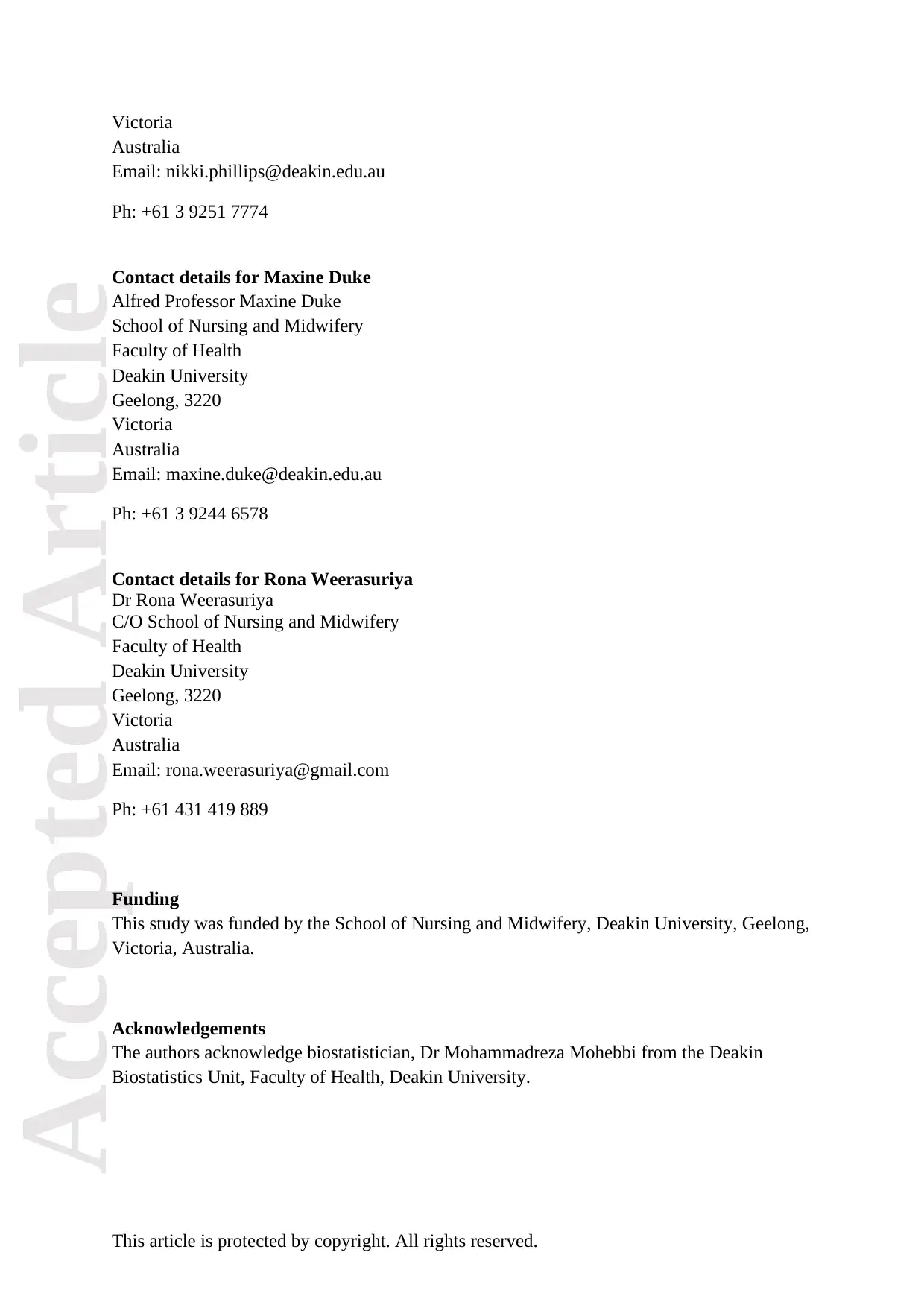
Accepted Article
This article is protected by copyright. All rights reserved.
Victoria
Australia
Email: nikki.phillips@deakin.edu.au
Ph: +61 3 9251 7774
Contact details for Maxine Duke
Alfred Professor Maxine Duke
School of Nursing and Midwifery
Faculty of Health
Deakin University
Geelong, 3220
Victoria
Australia
Email: maxine.duke@deakin.edu.au
Ph: +61 3 9244 6578
Contact details for Rona Weerasuriya
Dr Rona Weerasuriya
C/O School of Nursing and Midwifery
Faculty of Health
Deakin University
Geelong, 3220
Victoria
Australia
Email: rona.weerasuriya@gmail.com
Ph: +61 431 419 889
Funding
This study was funded by the School of Nursing and Midwifery, Deakin University, Geelong,
Victoria, Australia.
Acknowledgements
The authors acknowledge biostatistician, Dr Mohammadreza Mohebbi from the Deakin
Biostatistics Unit, Faculty of Health, Deakin University.
This article is protected by copyright. All rights reserved.
Victoria
Australia
Email: nikki.phillips@deakin.edu.au
Ph: +61 3 9251 7774
Contact details for Maxine Duke
Alfred Professor Maxine Duke
School of Nursing and Midwifery
Faculty of Health
Deakin University
Geelong, 3220
Victoria
Australia
Email: maxine.duke@deakin.edu.au
Ph: +61 3 9244 6578
Contact details for Rona Weerasuriya
Dr Rona Weerasuriya
C/O School of Nursing and Midwifery
Faculty of Health
Deakin University
Geelong, 3220
Victoria
Australia
Email: rona.weerasuriya@gmail.com
Ph: +61 431 419 889
Funding
This study was funded by the School of Nursing and Midwifery, Deakin University, Geelong,
Victoria, Australia.
Acknowledgements
The authors acknowledge biostatistician, Dr Mohammadreza Mohebbi from the Deakin
Biostatistics Unit, Faculty of Health, Deakin University.
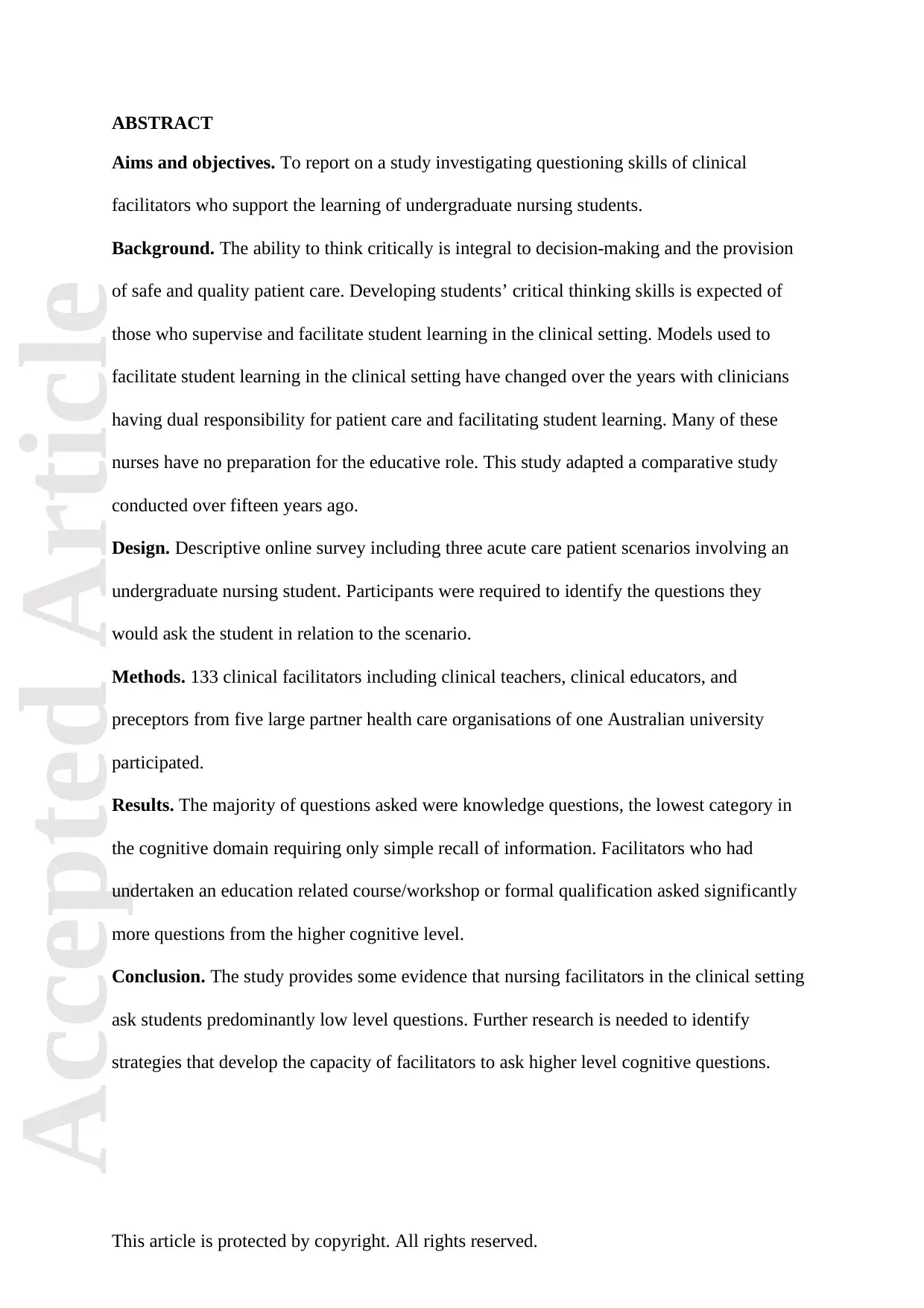
Accepted Article
This article is protected by copyright. All rights reserved.
ABSTRACT
Aims and objectives. To report on a study investigating questioning skills of clinical
facilitators who support the learning of undergraduate nursing students.
Background. The ability to think critically is integral to decision-making and the provision
of safe and quality patient care. Developing students’ critical thinking skills is expected of
those who supervise and facilitate student learning in the clinical setting. Models used to
facilitate student learning in the clinical setting have changed over the years with clinicians
having dual responsibility for patient care and facilitating student learning. Many of these
nurses have no preparation for the educative role. This study adapted a comparative study
conducted over fifteen years ago.
Design. Descriptive online survey including three acute care patient scenarios involving an
undergraduate nursing student. Participants were required to identify the questions they
would ask the student in relation to the scenario.
Methods. 133 clinical facilitators including clinical teachers, clinical educators, and
preceptors from five large partner health care organisations of one Australian university
participated.
Results. The majority of questions asked were knowledge questions, the lowest category in
the cognitive domain requiring only simple recall of information. Facilitators who had
undertaken an education related course/workshop or formal qualification asked significantly
more questions from the higher cognitive level.
Conclusion. The study provides some evidence that nursing facilitators in the clinical setting
ask students predominantly low level questions. Further research is needed to identify
strategies that develop the capacity of facilitators to ask higher level cognitive questions.
This article is protected by copyright. All rights reserved.
ABSTRACT
Aims and objectives. To report on a study investigating questioning skills of clinical
facilitators who support the learning of undergraduate nursing students.
Background. The ability to think critically is integral to decision-making and the provision
of safe and quality patient care. Developing students’ critical thinking skills is expected of
those who supervise and facilitate student learning in the clinical setting. Models used to
facilitate student learning in the clinical setting have changed over the years with clinicians
having dual responsibility for patient care and facilitating student learning. Many of these
nurses have no preparation for the educative role. This study adapted a comparative study
conducted over fifteen years ago.
Design. Descriptive online survey including three acute care patient scenarios involving an
undergraduate nursing student. Participants were required to identify the questions they
would ask the student in relation to the scenario.
Methods. 133 clinical facilitators including clinical teachers, clinical educators, and
preceptors from five large partner health care organisations of one Australian university
participated.
Results. The majority of questions asked were knowledge questions, the lowest category in
the cognitive domain requiring only simple recall of information. Facilitators who had
undertaken an education related course/workshop or formal qualification asked significantly
more questions from the higher cognitive level.
Conclusion. The study provides some evidence that nursing facilitators in the clinical setting
ask students predominantly low level questions. Further research is needed to identify
strategies that develop the capacity of facilitators to ask higher level cognitive questions.
⊘ This is a preview!⊘
Do you want full access?
Subscribe today to unlock all pages.

Trusted by 1+ million students worldwide
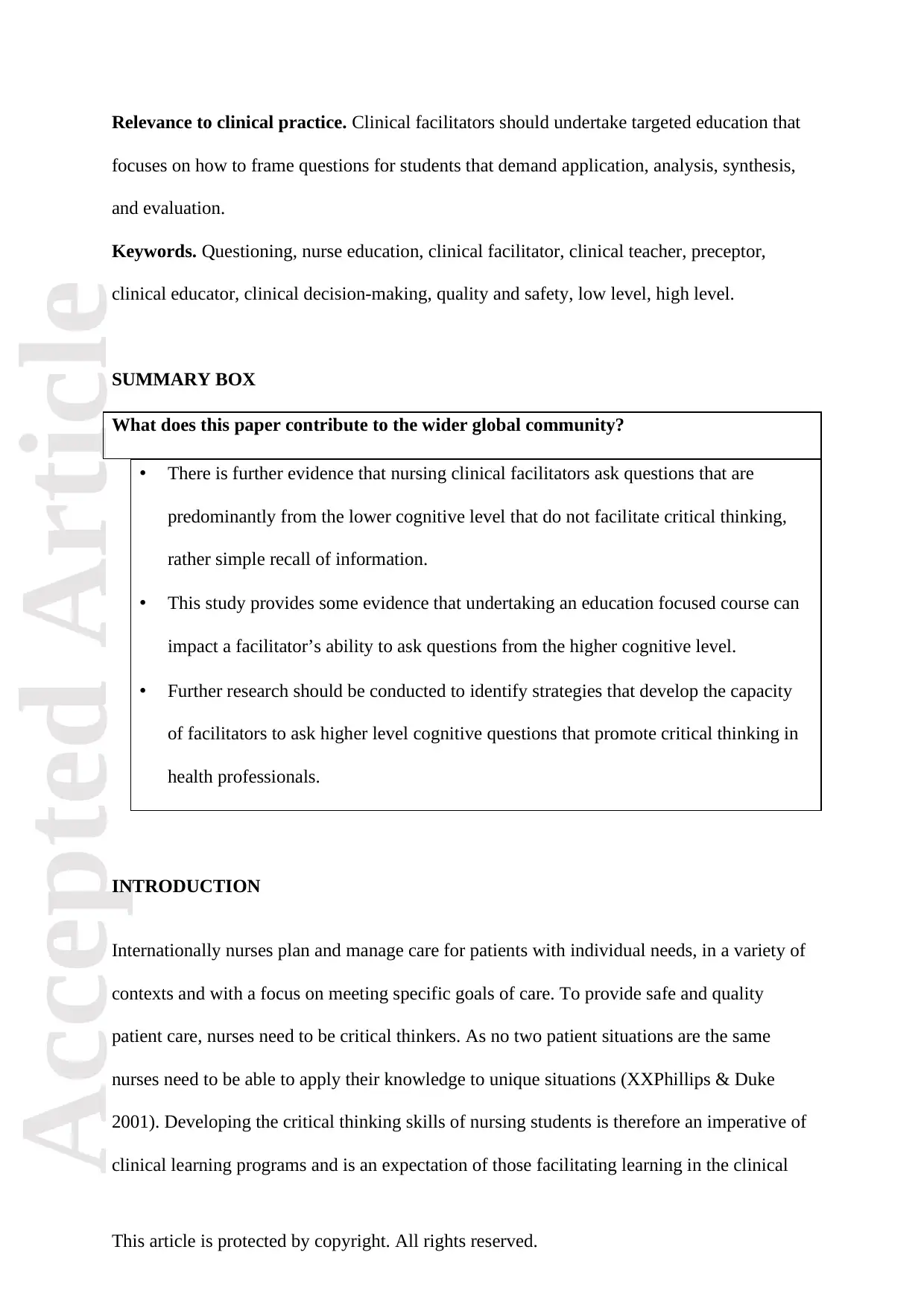
Accepted Article
This article is protected by copyright. All rights reserved.
Relevance to clinical practice. Clinical facilitators should undertake targeted education that
focuses on how to frame questions for students that demand application, analysis, synthesis,
and evaluation.
Keywords. Questioning, nurse education, clinical facilitator, clinical teacher, preceptor,
clinical educator, clinical decision-making, quality and safety, low level, high level.
SUMMARY BOX
What does this paper contribute to the wider global community?
• There is further evidence that nursing clinical facilitators ask questions that are
predominantly from the lower cognitive level that do not facilitate critical thinking,
rather simple recall of information.
• This study provides some evidence that undertaking an education focused course can
impact a facilitator’s ability to ask questions from the higher cognitive level.
• Further research should be conducted to identify strategies that develop the capacity
of facilitators to ask higher level cognitive questions that promote critical thinking in
health professionals.
INTRODUCTION
Internationally nurses plan and manage care for patients with individual needs, in a variety of
contexts and with a focus on meeting specific goals of care. To provide safe and quality
patient care, nurses need to be critical thinkers. As no two patient situations are the same
nurses need to be able to apply their knowledge to unique situations (XXPhillips & Duke
2001). Developing the critical thinking skills of nursing students is therefore an imperative of
clinical learning programs and is an expectation of those facilitating learning in the clinical
This article is protected by copyright. All rights reserved.
Relevance to clinical practice. Clinical facilitators should undertake targeted education that
focuses on how to frame questions for students that demand application, analysis, synthesis,
and evaluation.
Keywords. Questioning, nurse education, clinical facilitator, clinical teacher, preceptor,
clinical educator, clinical decision-making, quality and safety, low level, high level.
SUMMARY BOX
What does this paper contribute to the wider global community?
• There is further evidence that nursing clinical facilitators ask questions that are
predominantly from the lower cognitive level that do not facilitate critical thinking,
rather simple recall of information.
• This study provides some evidence that undertaking an education focused course can
impact a facilitator’s ability to ask questions from the higher cognitive level.
• Further research should be conducted to identify strategies that develop the capacity
of facilitators to ask higher level cognitive questions that promote critical thinking in
health professionals.
INTRODUCTION
Internationally nurses plan and manage care for patients with individual needs, in a variety of
contexts and with a focus on meeting specific goals of care. To provide safe and quality
patient care, nurses need to be critical thinkers. As no two patient situations are the same
nurses need to be able to apply their knowledge to unique situations (XXPhillips & Duke
2001). Developing the critical thinking skills of nursing students is therefore an imperative of
clinical learning programs and is an expectation of those facilitating learning in the clinical
Paraphrase This Document
Need a fresh take? Get an instant paraphrase of this document with our AI Paraphraser
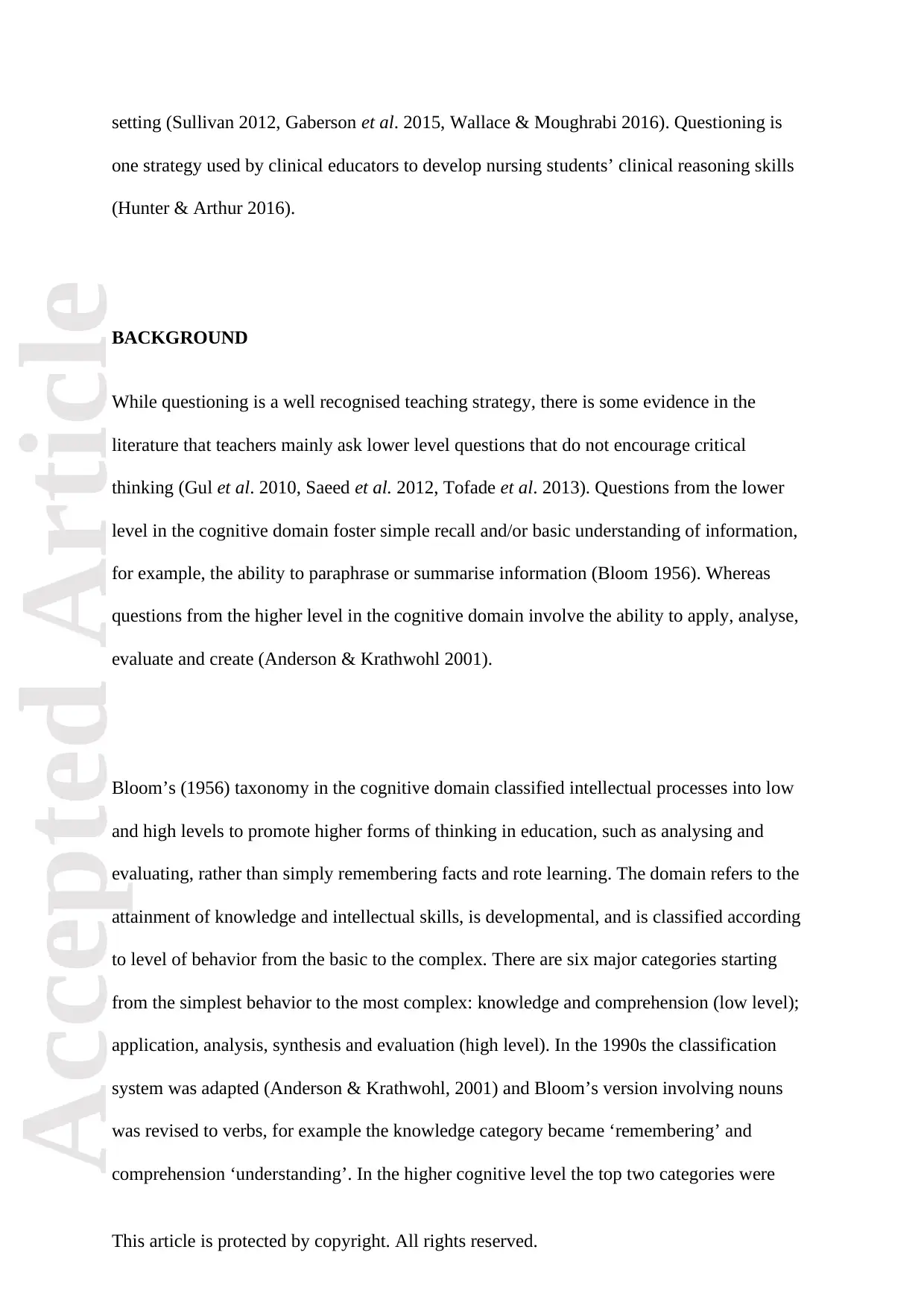
Accepted Article
This article is protected by copyright. All rights reserved.
setting (Sullivan 2012, Gaberson et al. 2015, Wallace & Moughrabi 2016). Questioning is
one strategy used by clinical educators to develop nursing students’ clinical reasoning skills
(Hunter & Arthur 2016).
BACKGROUND
While questioning is a well recognised teaching strategy, there is some evidence in the
literature that teachers mainly ask lower level questions that do not encourage critical
thinking (Gul et al. 2010, Saeed et al. 2012, Tofade et al. 2013). Questions from the lower
level in the cognitive domain foster simple recall and/or basic understanding of information,
for example, the ability to paraphrase or summarise information (Bloom 1956). Whereas
questions from the higher level in the cognitive domain involve the ability to apply, analyse,
evaluate and create (Anderson & Krathwohl 2001).
Bloom’s (1956) taxonomy in the cognitive domain classified intellectual processes into low
and high levels to promote higher forms of thinking in education, such as analysing and
evaluating, rather than simply remembering facts and rote learning. The domain refers to the
attainment of knowledge and intellectual skills, is developmental, and is classified according
to level of behavior from the basic to the complex. There are six major categories starting
from the simplest behavior to the most complex: knowledge and comprehension (low level);
application, analysis, synthesis and evaluation (high level). In the 1990s the classification
system was adapted (Anderson & Krathwohl, 2001) and Bloom’s version involving nouns
was revised to verbs, for example the knowledge category became ‘remembering’ and
comprehension ‘understanding’. In the higher cognitive level the top two categories were
This article is protected by copyright. All rights reserved.
setting (Sullivan 2012, Gaberson et al. 2015, Wallace & Moughrabi 2016). Questioning is
one strategy used by clinical educators to develop nursing students’ clinical reasoning skills
(Hunter & Arthur 2016).
BACKGROUND
While questioning is a well recognised teaching strategy, there is some evidence in the
literature that teachers mainly ask lower level questions that do not encourage critical
thinking (Gul et al. 2010, Saeed et al. 2012, Tofade et al. 2013). Questions from the lower
level in the cognitive domain foster simple recall and/or basic understanding of information,
for example, the ability to paraphrase or summarise information (Bloom 1956). Whereas
questions from the higher level in the cognitive domain involve the ability to apply, analyse,
evaluate and create (Anderson & Krathwohl 2001).
Bloom’s (1956) taxonomy in the cognitive domain classified intellectual processes into low
and high levels to promote higher forms of thinking in education, such as analysing and
evaluating, rather than simply remembering facts and rote learning. The domain refers to the
attainment of knowledge and intellectual skills, is developmental, and is classified according
to level of behavior from the basic to the complex. There are six major categories starting
from the simplest behavior to the most complex: knowledge and comprehension (low level);
application, analysis, synthesis and evaluation (high level). In the 1990s the classification
system was adapted (Anderson & Krathwohl, 2001) and Bloom’s version involving nouns
was revised to verbs, for example the knowledge category became ‘remembering’ and
comprehension ‘understanding’. In the higher cognitive level the top two categories were
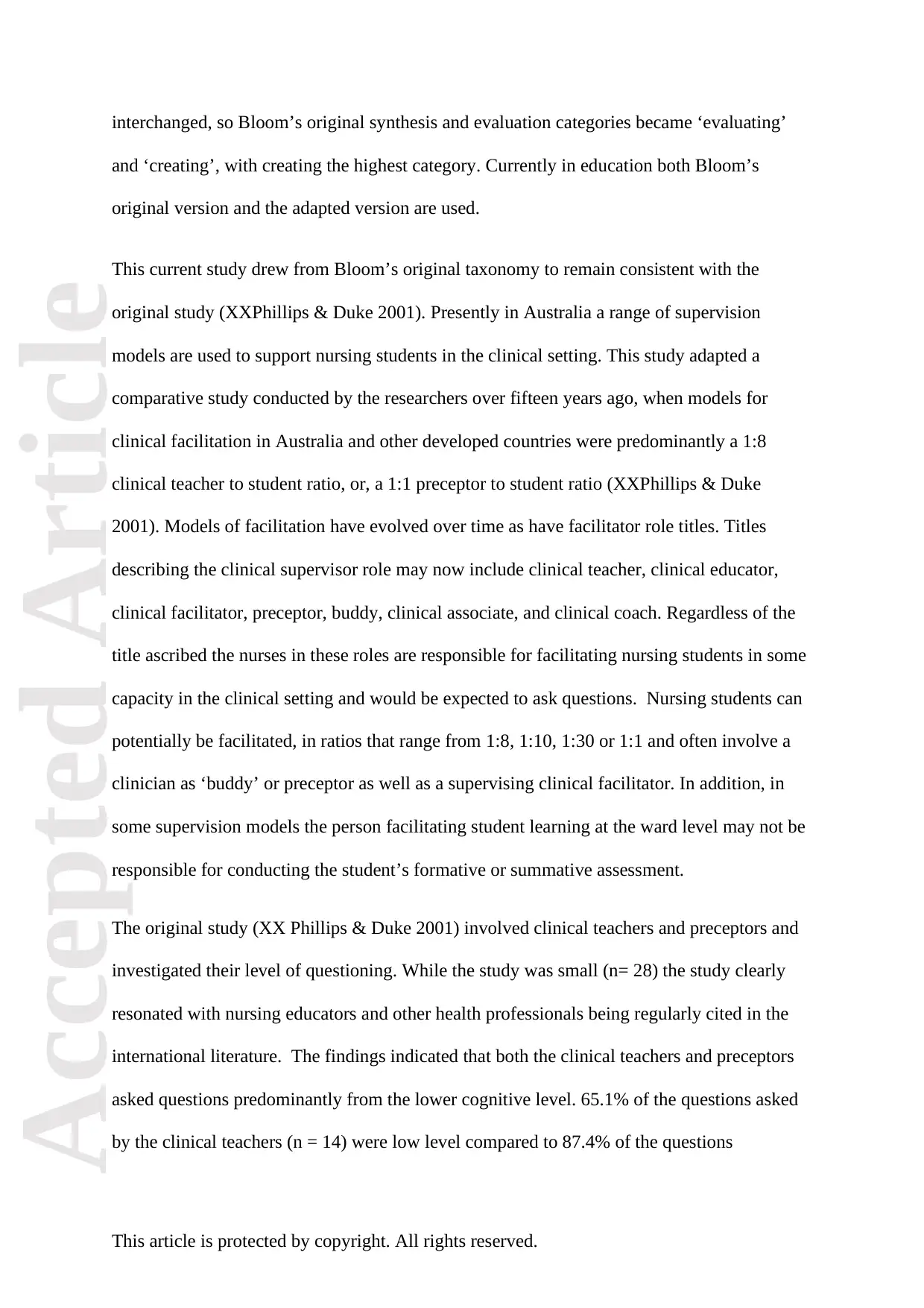
Accepted Article
This article is protected by copyright. All rights reserved.
interchanged, so Bloom’s original synthesis and evaluation categories became ‘evaluating’
and ‘creating’, with creating the highest category. Currently in education both Bloom’s
original version and the adapted version are used.
This current study drew from Bloom’s original taxonomy to remain consistent with the
original study (XXPhillips & Duke 2001). Presently in Australia a range of supervision
models are used to support nursing students in the clinical setting. This study adapted a
comparative study conducted by the researchers over fifteen years ago, when models for
clinical facilitation in Australia and other developed countries were predominantly a 1:8
clinical teacher to student ratio, or, a 1:1 preceptor to student ratio (XXPhillips & Duke
2001). Models of facilitation have evolved over time as have facilitator role titles. Titles
describing the clinical supervisor role may now include clinical teacher, clinical educator,
clinical facilitator, preceptor, buddy, clinical associate, and clinical coach. Regardless of the
title ascribed the nurses in these roles are responsible for facilitating nursing students in some
capacity in the clinical setting and would be expected to ask questions. Nursing students can
potentially be facilitated, in ratios that range from 1:8, 1:10, 1:30 or 1:1 and often involve a
clinician as ‘buddy’ or preceptor as well as a supervising clinical facilitator. In addition, in
some supervision models the person facilitating student learning at the ward level may not be
responsible for conducting the student’s formative or summative assessment.
The original study (XX Phillips & Duke 2001) involved clinical teachers and preceptors and
investigated their level of questioning. While the study was small (n= 28) the study clearly
resonated with nursing educators and other health professionals being regularly cited in the
international literature. The findings indicated that both the clinical teachers and preceptors
asked questions predominantly from the lower cognitive level. 65.1% of the questions asked
by the clinical teachers (n = 14) were low level compared to 87.4% of the questions
This article is protected by copyright. All rights reserved.
interchanged, so Bloom’s original synthesis and evaluation categories became ‘evaluating’
and ‘creating’, with creating the highest category. Currently in education both Bloom’s
original version and the adapted version are used.
This current study drew from Bloom’s original taxonomy to remain consistent with the
original study (XXPhillips & Duke 2001). Presently in Australia a range of supervision
models are used to support nursing students in the clinical setting. This study adapted a
comparative study conducted by the researchers over fifteen years ago, when models for
clinical facilitation in Australia and other developed countries were predominantly a 1:8
clinical teacher to student ratio, or, a 1:1 preceptor to student ratio (XXPhillips & Duke
2001). Models of facilitation have evolved over time as have facilitator role titles. Titles
describing the clinical supervisor role may now include clinical teacher, clinical educator,
clinical facilitator, preceptor, buddy, clinical associate, and clinical coach. Regardless of the
title ascribed the nurses in these roles are responsible for facilitating nursing students in some
capacity in the clinical setting and would be expected to ask questions. Nursing students can
potentially be facilitated, in ratios that range from 1:8, 1:10, 1:30 or 1:1 and often involve a
clinician as ‘buddy’ or preceptor as well as a supervising clinical facilitator. In addition, in
some supervision models the person facilitating student learning at the ward level may not be
responsible for conducting the student’s formative or summative assessment.
The original study (XX Phillips & Duke 2001) involved clinical teachers and preceptors and
investigated their level of questioning. While the study was small (n= 28) the study clearly
resonated with nursing educators and other health professionals being regularly cited in the
international literature. The findings indicated that both the clinical teachers and preceptors
asked questions predominantly from the lower cognitive level. 65.1% of the questions asked
by the clinical teachers (n = 14) were low level compared to 87.4% of the questions
⊘ This is a preview!⊘
Do you want full access?
Subscribe today to unlock all pages.

Trusted by 1+ million students worldwide
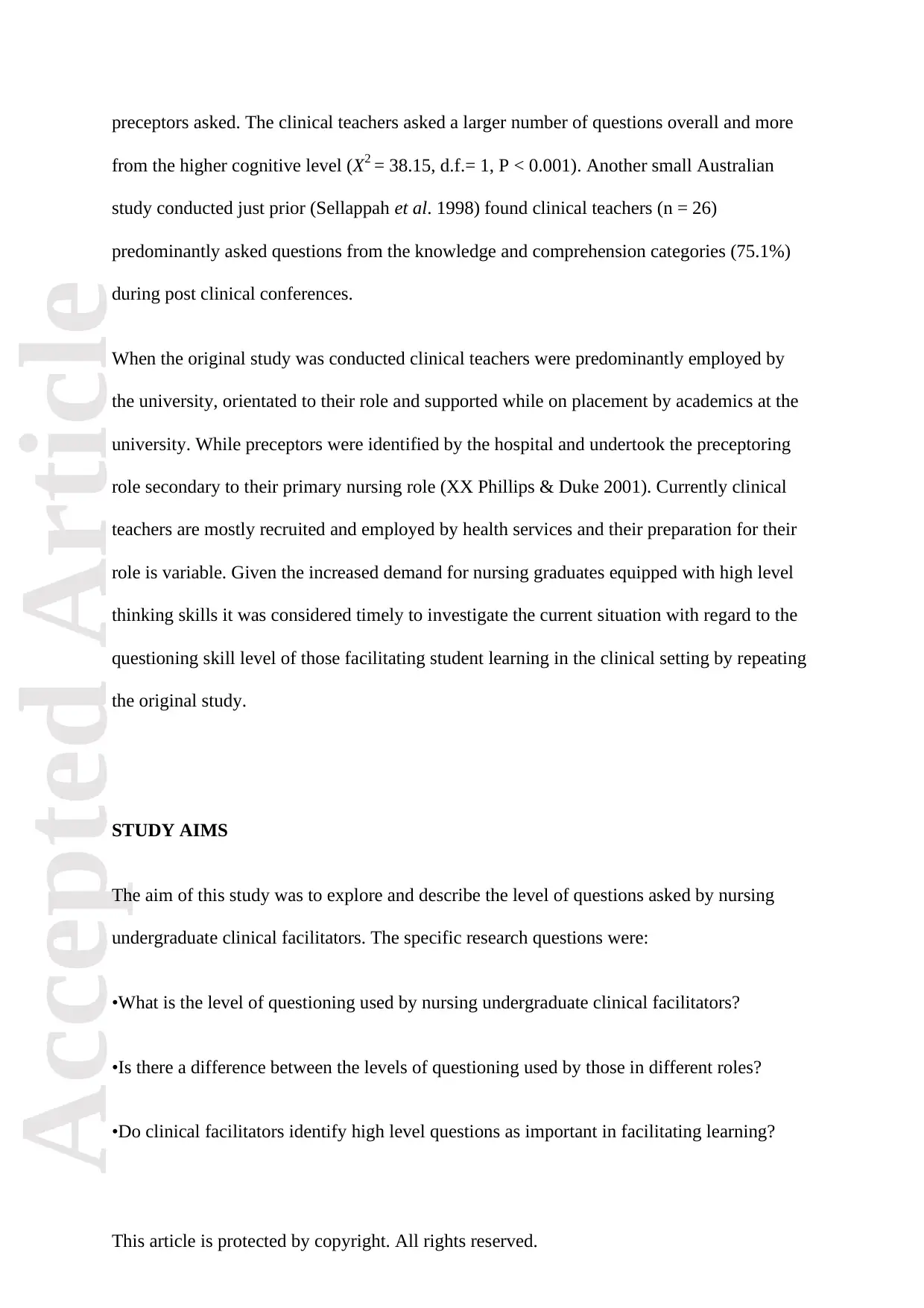
Accepted Article
This article is protected by copyright. All rights reserved.
preceptors asked. The clinical teachers asked a larger number of questions overall and more
from the higher cognitive level (X2 = 38.15, d.f.= 1, P < 0.001). Another small Australian
study conducted just prior (Sellappah et al. 1998) found clinical teachers (n = 26)
predominantly asked questions from the knowledge and comprehension categories (75.1%)
during post clinical conferences.
When the original study was conducted clinical teachers were predominantly employed by
the university, orientated to their role and supported while on placement by academics at the
university. While preceptors were identified by the hospital and undertook the preceptoring
role secondary to their primary nursing role (XX Phillips & Duke 2001). Currently clinical
teachers are mostly recruited and employed by health services and their preparation for their
role is variable. Given the increased demand for nursing graduates equipped with high level
thinking skills it was considered timely to investigate the current situation with regard to the
questioning skill level of those facilitating student learning in the clinical setting by repeating
the original study.
STUDY AIMS
The aim of this study was to explore and describe the level of questions asked by nursing
undergraduate clinical facilitators. The specific research questions were:
•What is the level of questioning used by nursing undergraduate clinical facilitators?
•Is there a difference between the levels of questioning used by those in different roles?
•Do clinical facilitators identify high level questions as important in facilitating learning?
This article is protected by copyright. All rights reserved.
preceptors asked. The clinical teachers asked a larger number of questions overall and more
from the higher cognitive level (X2 = 38.15, d.f.= 1, P < 0.001). Another small Australian
study conducted just prior (Sellappah et al. 1998) found clinical teachers (n = 26)
predominantly asked questions from the knowledge and comprehension categories (75.1%)
during post clinical conferences.
When the original study was conducted clinical teachers were predominantly employed by
the university, orientated to their role and supported while on placement by academics at the
university. While preceptors were identified by the hospital and undertook the preceptoring
role secondary to their primary nursing role (XX Phillips & Duke 2001). Currently clinical
teachers are mostly recruited and employed by health services and their preparation for their
role is variable. Given the increased demand for nursing graduates equipped with high level
thinking skills it was considered timely to investigate the current situation with regard to the
questioning skill level of those facilitating student learning in the clinical setting by repeating
the original study.
STUDY AIMS
The aim of this study was to explore and describe the level of questions asked by nursing
undergraduate clinical facilitators. The specific research questions were:
•What is the level of questioning used by nursing undergraduate clinical facilitators?
•Is there a difference between the levels of questioning used by those in different roles?
•Do clinical facilitators identify high level questions as important in facilitating learning?
Paraphrase This Document
Need a fresh take? Get an instant paraphrase of this document with our AI Paraphraser
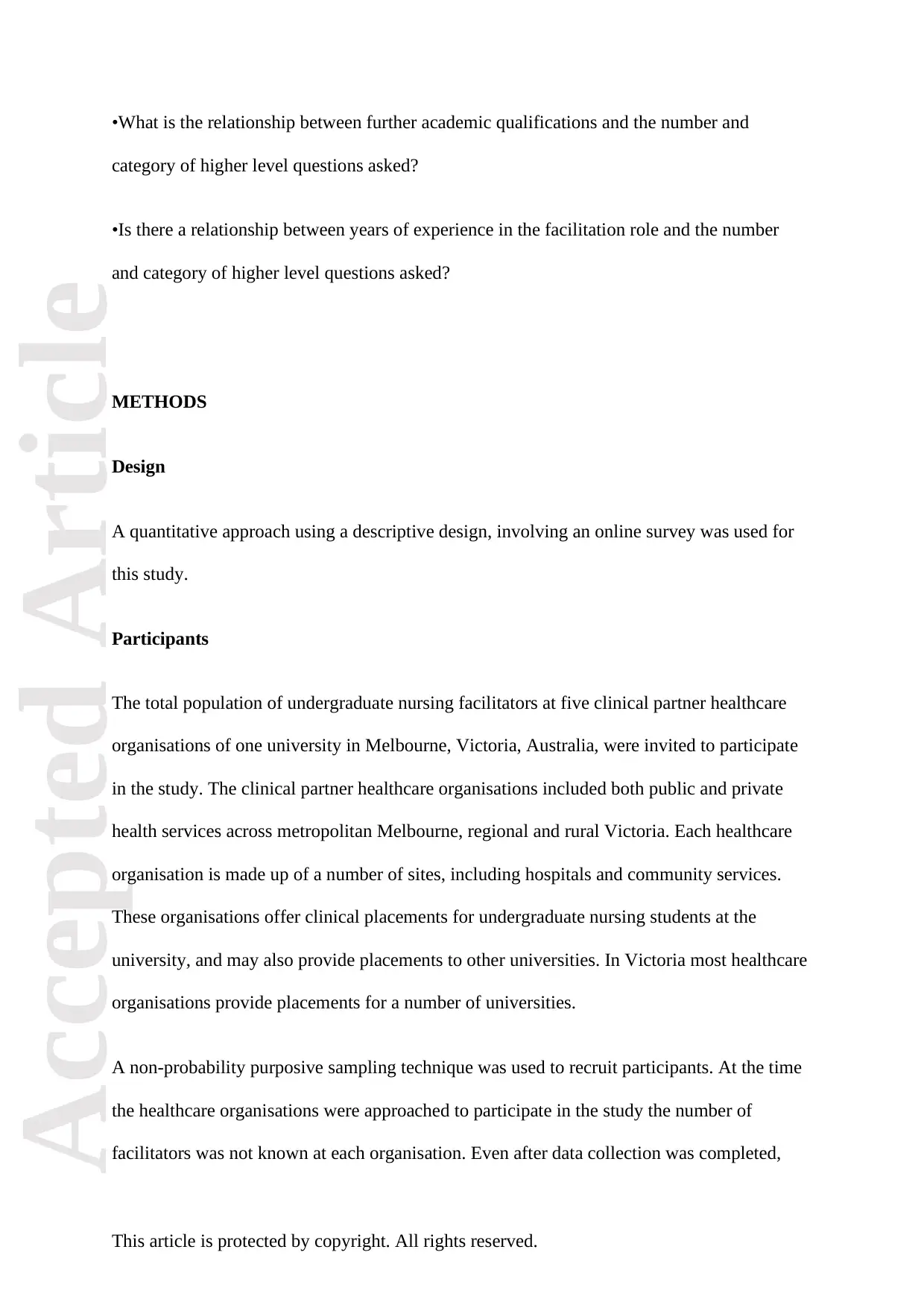
Accepted Article
This article is protected by copyright. All rights reserved.
•What is the relationship between further academic qualifications and the number and
category of higher level questions asked?
•Is there a relationship between years of experience in the facilitation role and the number
and category of higher level questions asked?
METHODS
Design
A quantitative approach using a descriptive design, involving an online survey was used for
this study.
Participants
The total population of undergraduate nursing facilitators at five clinical partner healthcare
organisations of one university in Melbourne, Victoria, Australia, were invited to participate
in the study. The clinical partner healthcare organisations included both public and private
health services across metropolitan Melbourne, regional and rural Victoria. Each healthcare
organisation is made up of a number of sites, including hospitals and community services.
These organisations offer clinical placements for undergraduate nursing students at the
university, and may also provide placements to other universities. In Victoria most healthcare
organisations provide placements for a number of universities.
A non-probability purposive sampling technique was used to recruit participants. At the time
the healthcare organisations were approached to participate in the study the number of
facilitators was not known at each organisation. Even after data collection was completed,
This article is protected by copyright. All rights reserved.
•What is the relationship between further academic qualifications and the number and
category of higher level questions asked?
•Is there a relationship between years of experience in the facilitation role and the number
and category of higher level questions asked?
METHODS
Design
A quantitative approach using a descriptive design, involving an online survey was used for
this study.
Participants
The total population of undergraduate nursing facilitators at five clinical partner healthcare
organisations of one university in Melbourne, Victoria, Australia, were invited to participate
in the study. The clinical partner healthcare organisations included both public and private
health services across metropolitan Melbourne, regional and rural Victoria. Each healthcare
organisation is made up of a number of sites, including hospitals and community services.
These organisations offer clinical placements for undergraduate nursing students at the
university, and may also provide placements to other universities. In Victoria most healthcare
organisations provide placements for a number of universities.
A non-probability purposive sampling technique was used to recruit participants. At the time
the healthcare organisations were approached to participate in the study the number of
facilitators was not known at each organisation. Even after data collection was completed,
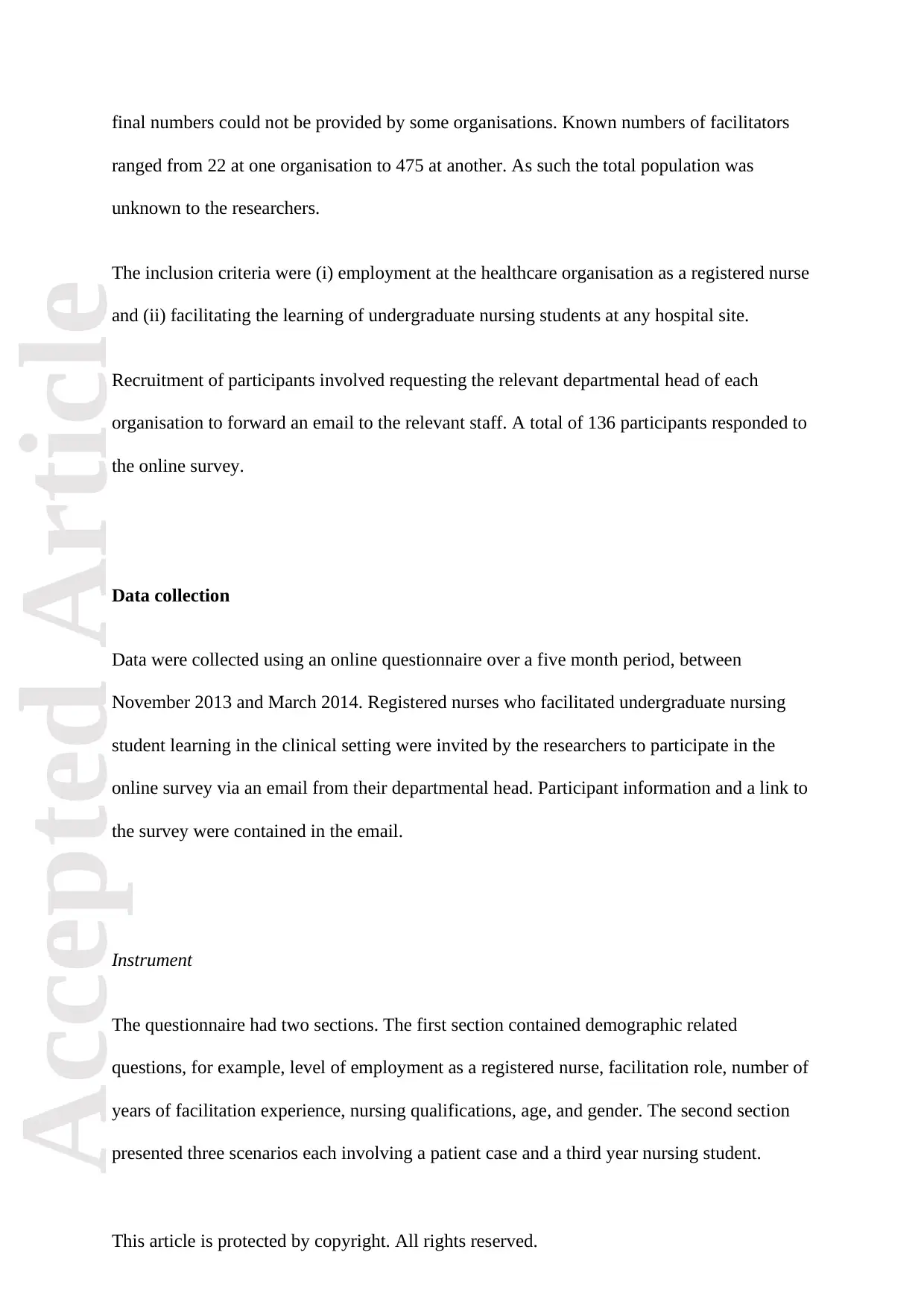
Accepted Article
This article is protected by copyright. All rights reserved.
final numbers could not be provided by some organisations. Known numbers of facilitators
ranged from 22 at one organisation to 475 at another. As such the total population was
unknown to the researchers.
The inclusion criteria were (i) employment at the healthcare organisation as a registered nurse
and (ii) facilitating the learning of undergraduate nursing students at any hospital site.
Recruitment of participants involved requesting the relevant departmental head of each
organisation to forward an email to the relevant staff. A total of 136 participants responded to
the online survey.
Data collection
Data were collected using an online questionnaire over a five month period, between
November 2013 and March 2014. Registered nurses who facilitated undergraduate nursing
student learning in the clinical setting were invited by the researchers to participate in the
online survey via an email from their departmental head. Participant information and a link to
the survey were contained in the email.
Instrument
The questionnaire had two sections. The first section contained demographic related
questions, for example, level of employment as a registered nurse, facilitation role, number of
years of facilitation experience, nursing qualifications, age, and gender. The second section
presented three scenarios each involving a patient case and a third year nursing student.
This article is protected by copyright. All rights reserved.
final numbers could not be provided by some organisations. Known numbers of facilitators
ranged from 22 at one organisation to 475 at another. As such the total population was
unknown to the researchers.
The inclusion criteria were (i) employment at the healthcare organisation as a registered nurse
and (ii) facilitating the learning of undergraduate nursing students at any hospital site.
Recruitment of participants involved requesting the relevant departmental head of each
organisation to forward an email to the relevant staff. A total of 136 participants responded to
the online survey.
Data collection
Data were collected using an online questionnaire over a five month period, between
November 2013 and March 2014. Registered nurses who facilitated undergraduate nursing
student learning in the clinical setting were invited by the researchers to participate in the
online survey via an email from their departmental head. Participant information and a link to
the survey were contained in the email.
Instrument
The questionnaire had two sections. The first section contained demographic related
questions, for example, level of employment as a registered nurse, facilitation role, number of
years of facilitation experience, nursing qualifications, age, and gender. The second section
presented three scenarios each involving a patient case and a third year nursing student.
⊘ This is a preview!⊘
Do you want full access?
Subscribe today to unlock all pages.

Trusted by 1+ million students worldwide
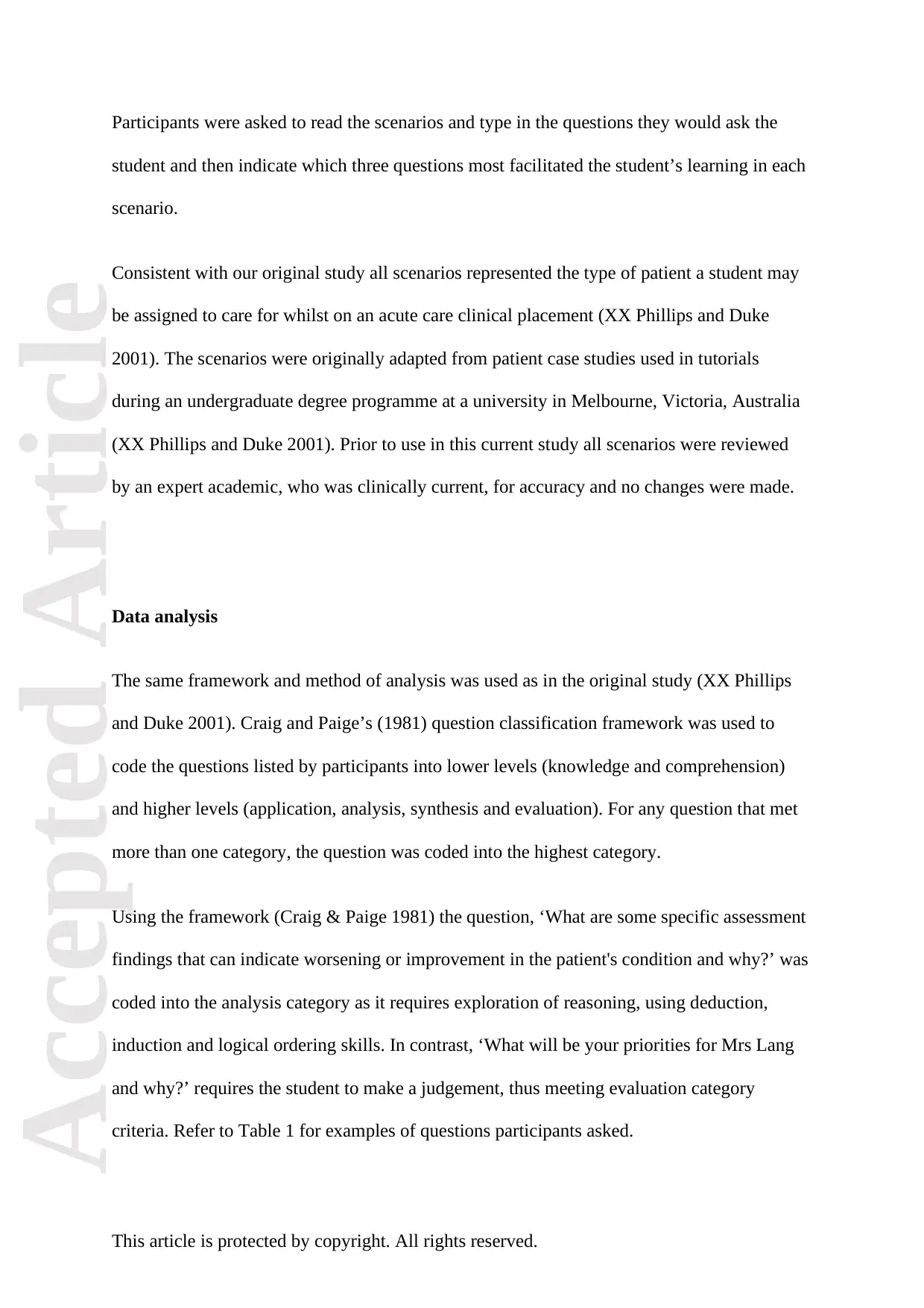
Accepted Article
This article is protected by copyright. All rights reserved.
Participants were asked to read the scenarios and type in the questions they would ask the
student and then indicate which three questions most facilitated the student’s learning in each
scenario.
Consistent with our original study all scenarios represented the type of patient a student may
be assigned to care for whilst on an acute care clinical placement (XX Phillips and Duke
2001). The scenarios were originally adapted from patient case studies used in tutorials
during an undergraduate degree programme at a university in Melbourne, Victoria, Australia
(XX Phillips and Duke 2001). Prior to use in this current study all scenarios were reviewed
by an expert academic, who was clinically current, for accuracy and no changes were made.
Data analysis
The same framework and method of analysis was used as in the original study (XX Phillips
and Duke 2001). Craig and Paige’s (1981) question classification framework was used to
code the questions listed by participants into lower levels (knowledge and comprehension)
and higher levels (application, analysis, synthesis and evaluation). For any question that met
more than one category, the question was coded into the highest category.
Using the framework (Craig & Paige 1981) the question, ‘What are some specific assessment
findings that can indicate worsening or improvement in the patient's condition and why?’ was
coded into the analysis category as it requires exploration of reasoning, using deduction,
induction and logical ordering skills. In contrast, ‘What will be your priorities for Mrs Lang
and why?’ requires the student to make a judgement, thus meeting evaluation category
criteria. Refer to Table 1 for examples of questions participants asked.
This article is protected by copyright. All rights reserved.
Participants were asked to read the scenarios and type in the questions they would ask the
student and then indicate which three questions most facilitated the student’s learning in each
scenario.
Consistent with our original study all scenarios represented the type of patient a student may
be assigned to care for whilst on an acute care clinical placement (XX Phillips and Duke
2001). The scenarios were originally adapted from patient case studies used in tutorials
during an undergraduate degree programme at a university in Melbourne, Victoria, Australia
(XX Phillips and Duke 2001). Prior to use in this current study all scenarios were reviewed
by an expert academic, who was clinically current, for accuracy and no changes were made.
Data analysis
The same framework and method of analysis was used as in the original study (XX Phillips
and Duke 2001). Craig and Paige’s (1981) question classification framework was used to
code the questions listed by participants into lower levels (knowledge and comprehension)
and higher levels (application, analysis, synthesis and evaluation). For any question that met
more than one category, the question was coded into the highest category.
Using the framework (Craig & Paige 1981) the question, ‘What are some specific assessment
findings that can indicate worsening or improvement in the patient's condition and why?’ was
coded into the analysis category as it requires exploration of reasoning, using deduction,
induction and logical ordering skills. In contrast, ‘What will be your priorities for Mrs Lang
and why?’ requires the student to make a judgement, thus meeting evaluation category
criteria. Refer to Table 1 for examples of questions participants asked.
Paraphrase This Document
Need a fresh take? Get an instant paraphrase of this document with our AI Paraphraser

Accepted Article
This article is protected by copyright. All rights reserved.
Descriptive statistics were used to summarise and describe the data and chi-square to test for
significant differences in the level of questioning between groups. One way ANOVA and t-
tests were conducted to analyse mean differences and statistical significance in relation to
education related course/workshop or formal qualifications, highest tertiary qualification,
years of experience in the facilitation role, and the number of higher level questions asked.
Validity and reliability/Rigour
The three scenarios were the same scenarios used in the original study (XXPhillips and Duke
2001). Each was reviewed by an expert for accuracy and currency.
Two researchers independently coded the responses to the three scenarios on 14 randomly
selected questionnaires (14/133, 10.53% of surveys). There was a total of 203 questions
asked in the 14 questionnaires. Of the 203 questions two questions were initially coded
differently by the researchers. These were discussed and agreement was reached; the third
researcher was not required. The high rate of percentage agreement achieved, 99.01%,
provided reassurance of interrater agreement and thus reliability. One researcher coded the
remaining surveys.
Of the remaining 122 participants’ responses coded, there were 9 questions which were
discussed with the two researchers and deferred to a third researcher.
Ethical considerations
Ethics approval was granted from the appropriate committees at the university and each
health care organisation. The online survey contained no identifying data. To further ensure
anonymity potential participants were invited to participate via an email sent from the
This article is protected by copyright. All rights reserved.
Descriptive statistics were used to summarise and describe the data and chi-square to test for
significant differences in the level of questioning between groups. One way ANOVA and t-
tests were conducted to analyse mean differences and statistical significance in relation to
education related course/workshop or formal qualifications, highest tertiary qualification,
years of experience in the facilitation role, and the number of higher level questions asked.
Validity and reliability/Rigour
The three scenarios were the same scenarios used in the original study (XXPhillips and Duke
2001). Each was reviewed by an expert for accuracy and currency.
Two researchers independently coded the responses to the three scenarios on 14 randomly
selected questionnaires (14/133, 10.53% of surveys). There was a total of 203 questions
asked in the 14 questionnaires. Of the 203 questions two questions were initially coded
differently by the researchers. These were discussed and agreement was reached; the third
researcher was not required. The high rate of percentage agreement achieved, 99.01%,
provided reassurance of interrater agreement and thus reliability. One researcher coded the
remaining surveys.
Of the remaining 122 participants’ responses coded, there were 9 questions which were
discussed with the two researchers and deferred to a third researcher.
Ethical considerations
Ethics approval was granted from the appropriate committees at the university and each
health care organisation. The online survey contained no identifying data. To further ensure
anonymity potential participants were invited to participate via an email sent from the
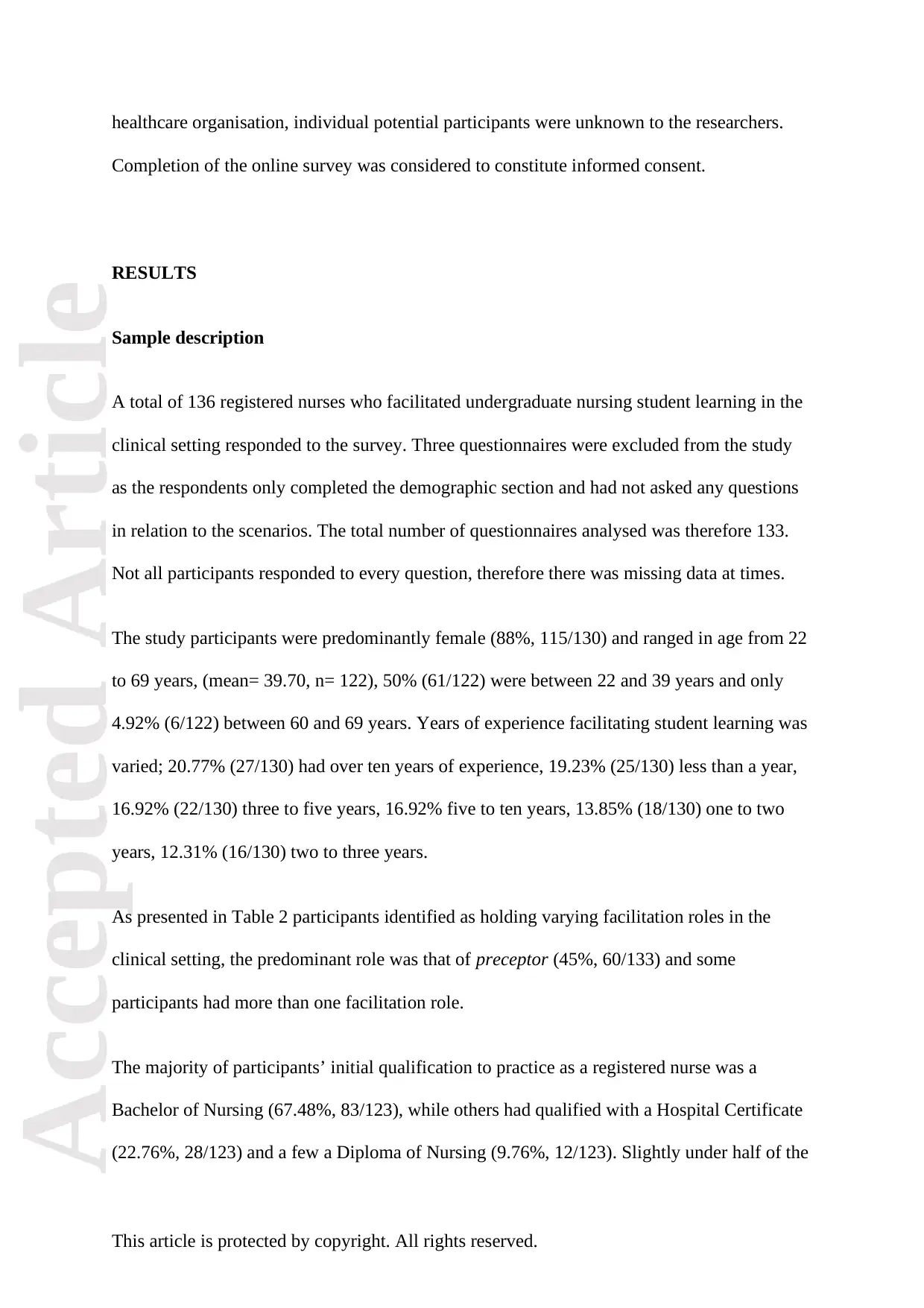
Accepted Article
This article is protected by copyright. All rights reserved.
healthcare organisation, individual potential participants were unknown to the researchers.
Completion of the online survey was considered to constitute informed consent.
RESULTS
Sample description
A total of 136 registered nurses who facilitated undergraduate nursing student learning in the
clinical setting responded to the survey. Three questionnaires were excluded from the study
as the respondents only completed the demographic section and had not asked any questions
in relation to the scenarios. The total number of questionnaires analysed was therefore 133.
Not all participants responded to every question, therefore there was missing data at times.
The study participants were predominantly female (88%, 115/130) and ranged in age from 22
to 69 years, (mean= 39.70, n= 122), 50% (61/122) were between 22 and 39 years and only
4.92% (6/122) between 60 and 69 years. Years of experience facilitating student learning was
varied; 20.77% (27/130) had over ten years of experience, 19.23% (25/130) less than a year,
16.92% (22/130) three to five years, 16.92% five to ten years, 13.85% (18/130) one to two
years, 12.31% (16/130) two to three years.
As presented in Table 2 participants identified as holding varying facilitation roles in the
clinical setting, the predominant role was that of preceptor (45%, 60/133) and some
participants had more than one facilitation role.
The majority of participants’ initial qualification to practice as a registered nurse was a
Bachelor of Nursing (67.48%, 83/123), while others had qualified with a Hospital Certificate
(22.76%, 28/123) and a few a Diploma of Nursing (9.76%, 12/123). Slightly under half of the
This article is protected by copyright. All rights reserved.
healthcare organisation, individual potential participants were unknown to the researchers.
Completion of the online survey was considered to constitute informed consent.
RESULTS
Sample description
A total of 136 registered nurses who facilitated undergraduate nursing student learning in the
clinical setting responded to the survey. Three questionnaires were excluded from the study
as the respondents only completed the demographic section and had not asked any questions
in relation to the scenarios. The total number of questionnaires analysed was therefore 133.
Not all participants responded to every question, therefore there was missing data at times.
The study participants were predominantly female (88%, 115/130) and ranged in age from 22
to 69 years, (mean= 39.70, n= 122), 50% (61/122) were between 22 and 39 years and only
4.92% (6/122) between 60 and 69 years. Years of experience facilitating student learning was
varied; 20.77% (27/130) had over ten years of experience, 19.23% (25/130) less than a year,
16.92% (22/130) three to five years, 16.92% five to ten years, 13.85% (18/130) one to two
years, 12.31% (16/130) two to three years.
As presented in Table 2 participants identified as holding varying facilitation roles in the
clinical setting, the predominant role was that of preceptor (45%, 60/133) and some
participants had more than one facilitation role.
The majority of participants’ initial qualification to practice as a registered nurse was a
Bachelor of Nursing (67.48%, 83/123), while others had qualified with a Hospital Certificate
(22.76%, 28/123) and a few a Diploma of Nursing (9.76%, 12/123). Slightly under half of the
⊘ This is a preview!⊘
Do you want full access?
Subscribe today to unlock all pages.

Trusted by 1+ million students worldwide
1 out of 27
Your All-in-One AI-Powered Toolkit for Academic Success.
+13062052269
info@desklib.com
Available 24*7 on WhatsApp / Email
![[object Object]](/_next/static/media/star-bottom.7253800d.svg)
Unlock your academic potential
Copyright © 2020–2025 A2Z Services. All Rights Reserved. Developed and managed by ZUCOL.
